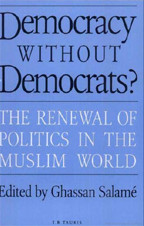Democracy without democrats?

01.09.1994
Ghassan Salamé
B. Tauris & Co.
Ideas of democracy and political liberalisation have become central to
political debate within and about the Middle Fast. The current focus on
the merits of democratic practice in many areas of the world, coupled
with the spread of economic liberalism, will inevitably, according to
some accounts, bring about a measure of political pluralism. Against
this, the persistence of authoritarian regimes in the Middle East,
together with the fragility of experiments with democracy, has revived
an old argument among some Western academics and among many proponents
of cultural nationalism within the Middle East, that Islam and democracy
are essentially irreconcilable.
This book brings together many of the best-known writers on Middle
Eastern politics to address the issues that inform the debate. In
particular, the contributors challenge the assumption that the Middle
East is a unique case, resistant to the social, economic and ideological
trends that shape politics throughout the world. The authors draw on a
rich fund of theory and refer to a number of national cases to discuss
social change, institutional evolution and the prevailing political
discourse in the Middle East and to offer new frameworks within which to
analyse the process of democratisation.
Contributors: Al-Azmeh, J.-F. Bayart, P. Fargues, A. Hermassi,
G. Kramer, J. Leca, G. Luciani, R. Owen, V. Perthes, O. Roy, G. Salamé,
J. Waterbury
Ideas of democracy and political liberalisation have become central to political debate within and about the Middle Fast. The current focus on the merits of democratic practice in many areas of the world, coupled with the spread of economic liberalism, will inevitably, according to some accounts, bring about a measure of political pluralism. Against this, the persistence of authoritarian regimes in the Middle East, together with the fragility of experiments with democracy, has revived an old argument among some Western academics and among many proponents of cultural nationalism within the Middle East, that Islam and democracy are essentially irreconcilable.
This book brings together many of the best-known writers on Middle Eastern politics to address the issues that inform the debate. In particular, the contributors challenge the assumption that the Middle East is a unique case, resistant to the social, economic and ideological trends that shape politics throughout the world. The authors draw on a rich fund of theory and refer to a number of national cases to discuss social change, institutional evolution and the prevailing political discourse in the Middle East and to offer new frameworks within which to analyse the process of democratisation.
Contributors: Al-Azmeh, J.-F. Bayart, P. Fargues, A. Hermassi, G. Kramer, J. Leca, G. Luciani, R. Owen, V. Perthes, O. Roy, G. Salamé, J. Waterbury
